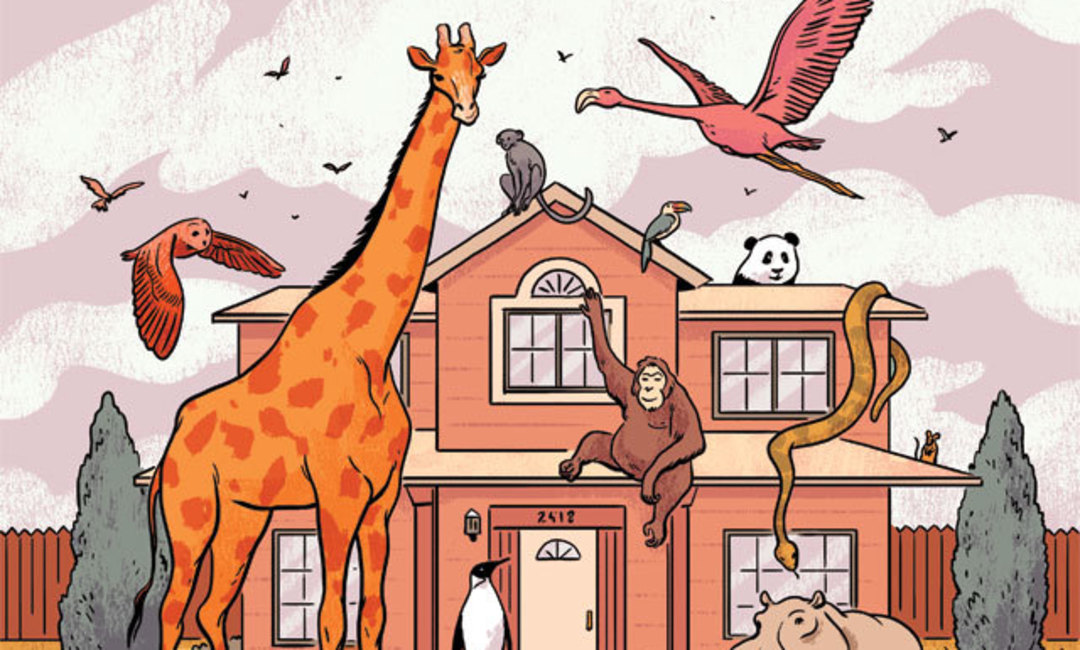Ride a Camel! Meet a Monkey! Buy a House?

In a crowded housing market, Bridgeland, a rapidly growing community in Cypress, turns to lions, lemurs, and yaks to get attention.
Image: Kyle T. Webster
For several months, Beth Simmons, a cheerful, 28-year-old, stay-at-home mother of two, and her husband, an executive chef, had been in the market for a new home. To be clear, they were not exactly unhappy with their present one near Bear Creek, surrounded as it is by dozens of artfully crafted communities boasting access to winding water features, high-quality schools, and dense, kid-friendly greenbelts. But Bridgeland, a rapidly growing community on 11,400 acres in Cypress, seemed to offer Simmons something more, something extra: the chance to mount a camel.
Of course, it’s always possible that the Simmonses and the roughly 10,000 other potential homebuyers were seduced by the manmade lakes and walk-in closets and open-air kitchens of Bridgeland. But the betting money was on the camels, who had been pressed into service by the organizers of the seventh annual Nature Fest in April, which brought homebuyers face-to-face with kangaroos, yaks, lemurs, and lions—as well as agents from local chapters of Re/Max and Better Homes and Gardens Real Estate Gary Greene.
Attendees were also lured, apparently, by the promise of food trucks, laser tag, kayaking, armadillo racing, a domesticated wolf on a leash (which may or may not have been a preternaturally large collie), and the chance to break the Guinness World Record for a simultaneous birdcall. Indeed, midway through the afternoon, when 994 people did their best impression of a northern cardinal, they shattered the old mark. (It had stood since 2011, when a crowd of 801 people mimicked the nighttime call of a barred owl at the Midwest Birding Symposium.)
“It doesn’t get any better than this,” said Simmons, who checked in after her family had consumed a funnel cake and hand-fed a slimy-tongued camel, hopefully in that exact order. “We saw a camel, lemurs, a few monkeys, and we loved it.” More to the point: “I could see us buying a home here in the next year.”
The kids were on board too, she told us later. “They didn’t stop talking about Nature Fest for days. It blew my mind.”
According to the Houston Association of Realtors, there are close to 90 master-planned communities across the Houston area, each with its own unique amount of housing stock, and all bent on maximizing profits from the nation’s biggest housing boom. Last year, 34,500 single-family building permits were issued in Houston, almost as many as in the entire state of California, according to the National Association of Home Builders. Given the sheer number of new houses out there, potential homebuyers often don’t know where to start—hence attention-getting stunts like Nature Fest.
“We looked at these large public events as a way to make Bridgeland a destination, especially for Cypress,” said Lona Ship, the community’s marketing manager, who helped start Nature Fest about two years after the neighborhood’s founding in 2006 as a way to highlight its outdoorsy elements: the hiking trails, green space, farmers market, waterways and lakes that are home to migratory birds, and on and on. Organizers settled on animals as a way to brand Bridgeland a destination for nature-loving homebuyers, and the stratagem worked, even if the animals are mostly non-natives, like lemurs from the jungles of Madagascar. “When we’re interacting with potential buyers, a lot of them will tell us that they went to Nature Fest and had an amazing experience,” said Ship, “and that’s when we know we’re doing the right thing.”
(Whether it’s right for the animals is, we later learned, a question. Most of them came from Staples Safari Zoo in Washington state, including a capuchin named Wilson, a chirping, juice box–swilling monkey who starred alongside Eddie Murphy in the 1998 version of Dr. Dolittle and, not content to rest on his laurels, made headlines mere days after the Bridgeland event, when he slapped KHOU host Deborah Duncan for taunting him with a grape on a Great Day Houston segment that went viral. But fruit withholding may be the least of the capuchin’s problems. Last November, the zoo’s owner, Brian Staples, was hit with a federal complaint alleging that, among other things, he failed to meet the minimal standards of care for his primates.)
For now, Bridgeland’s Nature Fest is the biggest event of its kind, but its successes haven’t gone unnoticed. Nearby Towne Lake, a master-planned community which residents traverse by boat, hosts a springtime Lake-A-Palooza featuring leaping dock dogs, a fishing tournament, boat tours, and waterskiing demonstrations by the Aggie Ski Team. At Cross Creek Ranch, just west of Katy, homebuyers are invited to the Fest of Tails each April, a day-long event showcasing giant kites, Frisbee-catching dogs, and a canine talent show. And last October, Riverstone, a 3,700-acre development in Fort Bend County, unveiled a, well, scented homes tour.
“Not only will visitors be inspired by the trendsetting décor, but they will be treated to a relaxing aromatherapy experience, with fragrances complementing a room’s theme, such as a lemongrass master suite,” explained marketing director Christen Johnson in a press release that, admittedly, offered no explanation of the connection between scented rooms and the decision to buy a Mediterranean garden home.
Not that anyone needed to, according to Jacqueline Kacen, a professor of marketing at the University of Houston’s C.T. Bauer College of Business. In a sprawling metropolis like ours, she said, in which prospective buyers can visit only so many houses, making an impression is both difficult and necessary. Thus, an electric diffuser that releases cranberry pomegranate into dining rooms, citrus into kitchens, and ginger spice into theater rooms. “There’s research that shows that scent can have a very powerful influence on people, so it makes perfect sense for companies to use this for commercial purposes.” In other words, scents make sense make cents.
“I would never go so far to say that an exotic tiger or the scent of vanilla bean would be enough to make someone buy a house,” Kacen told us. “Homebuyers are rational people, who look at bedrooms, schools, and square-footage. That said, with all else being equal, something small that produces a good feeling could tip the scale.”




